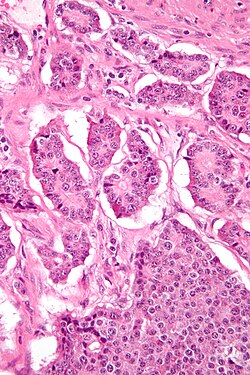Neuroendocrine tumor
Neuroendocrine tumors (NETs) are neoplasms that starts from cells of the endocrine (hormonal) and nervous systems. Many are benign, while some are malignant. They most commonly occur in the intestine, where they are often called carcinoid tumors, but they are also found in the pancreas, lung and the rest of the body.[1]
| Neuroendocrine tumor | |
|---|---|
 | |
| Micrograph of a neuroendocrine tumor. H&E stain. |
Many tests can be used to diagnose neuroendocrine tumours, including blood tests, urine tests, scans and a biopsy (where a small tissue sample is taken for closer examination).
Neuroendocrine Tumor Media
Synaptophysin immunohistochemistry of neuroendocrine tumor, staining positively
Nuclei of neuroendocrine tumors often show granular "salt-and-pepper" chromatin, as seen here on H&E stain and Pap stain.
Small intestinal neuroendocrine tumor at bottom third of image, showing the typical intramural (within the wall) location, and overlying intact epithelium. H&E stain.
References
- ↑ Lua error in Module:Citation/CS1/Identifiers at line 630: attempt to index field 'known_free_doi_registrants_t' (a nil value).




